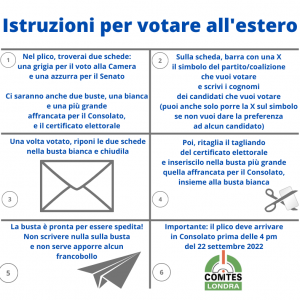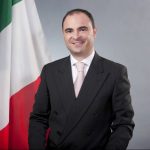ELECTIONS 2022
On September 25, Italy will elect a new government. For the Italian community abroad, this is another opportunity to express their choice of policies, though this time within the framework of a much-reduced representation. Recent parliamentary reforms have drastically reduced the number of elected representatives from 12 to 8 in the lower Chamber and 6 to 4 in the Senate. With 5 million voters abroad, this isn’t exactly a tremendous democratic representation, in our opinion.
How do you vote?
AIRE registered citizens will vote by post. The ballot papers will be sent by the first week of September and need to be returned to the appropriate consular office by the 22 September deadline for the votes to be sent to Italy to be counted. A complete list of candidates is available here http://www.italoeuropeo.com/2022/08/24/elezioni-politiche-2022-ecco-tutte-le-liste-dei-candidati-allestero/
The diagram below from the London Comites will help you with the process in question.

Candidates information
To help you pick the candidate of your choice, this is what we have done:
- we have searched through various data banks for candidates’ email addresses. Sadly very few were publicly available, but we have done our best to search through various sources, even sending messages on social media (primarily unanswered)
- we have then emailed all of the available contacts explaining that we would give everyone a chance to address four topics of concern to the Italian community
- the replies we are now publishing are the ones we have received so far. There is no attempt to influence you.
- The questions we asked
Each candidate, irrespective of their political party, was asked the same questions as below:
Questions
- Tell us the three main points of your political program to protect the interests of Italian citizens abroad.
- Many residents feel unrepresented by Comites, as evidenced by low voter turnout. This is partly due to the convoluted voting process for those elections. What are your plans?
- Access to essential consular services can be a problem for many Italians abroad, especially those who live far from a consulate or simply because of the long waiting list. What is your proposal
- What about protecting the rights of elderly and vulnerable Italian citizens living abroad? Many feel alienated by the perception – right or wrong – that the Italian government cares more about migrants in Italy than about them, even though indirectly, the Italian community has always contributed fiscally to the nation.
Angelo Di Pietro
Candidate for the Chamber of Deputies for Europe
Vito De Palma
Candidate for the Chamber of Deputies for South America
THE ANSWERS

Candidate: Giuseppe Stabile
Party affiliation: FDI
Region: EUROPE
Tell us the three main points of your political program to protect the interests of Italian citizens abroad.
– REGULATORY REVIEW REGARDING SOCIAL AND HEALTH AND FISCAL ASSISTANCE TO FIGHT THE CURRENT INPARITY OF TREATMENT AND BILATERAL AGREEMENTS IN THE ECONOMIC, CULTURAL AND PROFESSIONAL SECTOR, IMPROVING THE POSSIBILITIES INTRODUCED BY COMMUNITY LAW. BETWEEN ITALY AND SPAIN FINALLY REACH THE BILATERAL AGREEMENT THAT INTRODUCES THE RIGHT OF DOUBLE CITIZENSHIP.
– EFFECTIVE AND LEAN INCENTIVE PROCEDURES FOR THE RETURN OF WORKING TALENTS: 1/10 of the resources currently allocated for the Citizenship Income must be used to establish the RETURN INCOME to economically help all AIRE residents who return to their homeland for the first 12 months;
– IMU ABOLITION ON THE FIRST HOUSE FOR ALL CITIZENS RESIDING AIRE AND REGIONAL AND MUNICIPAL ADDITIONALS;
– ENHANCEMENT OF CONSULAR SERVICES AND SLIMMING PROCEDURES FOR ACCESSING IT: more digitization in citizen / consulate relations also by establishing, with specific bilateral agreements, the mutual recognition of the digital identity certificates of the host country (e.g. the SPID recognized by the Spanish Consulate in Italy and the Spanish digital certificate from the Italian Consulate in the Spanish Kingdom).
Many residents feel unrepresented by Comites, as evidenced by low voter turnout. This is partly due to the convoluted voting process for those elections. What are your plans?
On the one hand we have the inversion of the voting option (ie the procedure by which the voter must communicate their will to vote), a measure introduced at the time by the PD. On the other hand, a total absence of operational tools that do not allow us to make a difference. Generally, after a first enthusiastic gallop we end up following the same orbit of previous experiences with the exhaustion due to loss of momentum and physical limits reached. at home without having to request it anymore. This measure will undoubtedly increase the knowledge of this important representative body and also the curiosity in following its activities during the months with a spirit of proposition and control.
Access to essential consular services can be a problem for many Italians abroad, especially those who live far from a consulate or simply because of the long waiting list. What is your proposal?
If we have the Honorary Consuls at our disposal, let us use them and put them truly in a position to operate. However, it is necessary to review the Circular 3 of the MAECI with regard to the prerogatives and the appointment of the figures in question.
The acceptance of the assignment by the honorary figure should commit the same to carry out this task as a priority and not be justified by the fact that being unpaid can allow the subject mainly his private activity.
What about protecting the rights of elderly and vulnerable Italian citizens living abroad? Many feel alienated by the perception - right or wrong - that the Italian government cares more about migrants in Italy than about them, even though indirectly, the Italian community has always contributed fiscally to the nation.
It was once said that Italy is not a country for young people, now it is not even for retirees. Politics has always trivialized this aspect by talking about fluid and circular movements of people. Those who leave from the Belpaese do so mainly to find better and dignified living conditions, and if they find them it is difficult to return to Italy. , a cultural revolution, for too long politics has been short-sighted and deaf to the point of, and this is evident, blindness.

Candidate: Andrea Di Giuseppe
Party affiliation: FDI
Region: North and Central America
Tell us the three main points of your political program to protect the interests of Italian citizens abroad.
Many residents feel unrepresented by Comites, as evidenced by low voter turnout. This is partly due to the convoluted voting process for those elections. What are your plans?
I experienced firsthand the cumbersome election of Com.It.Es., a striking example of bureaucracy and disorganization. To participate in the vote, it was necessary to subscribe to a special list in a very short time frame and the portal did not work correctly and often contradictory reply emails came in which reported the registration in the subject while in the text they asked to repeat the operation. To this we add the lack of upstream checks on candidates and the problems that later emerged on the ineligibility of some of them. A profound reform is needed that gives access to all those entitled to vote, without subscribing to useless ad hoc lists (which also represent an unnecessary expense for taxpayers) and thorough checks on candidates.
Access to essential consular services can be a problem for many Italians abroad, especially those who live far from a consulate or simply because of the long waiting list. What is your proposal?
I have the utmost respect for consulates and those who work there but it is clear to everyone that many questions remain unanswered and that the answers to the problems of our community are not timely. I am an entrepreneur and if a production process needs 5 people, I put 5 people and I make sure I have substitutes ready in case of unforeseen events. The consular network is underpowered, does not have a sufficient number of employees and some of these would need more in-depth training. They must be strengthened without delay but those who work there must be prepared. In addition, we need to work on faster service delivery. Italy is famous for bureaucracy but what happens abroad sometimes borders on shame.
What about protecting the rights of elderly and vulnerable Italian citizens living abroad? Many feel alienated by the perception - right or wrong - that the Italian government cares more about migrants in Italy than about them, even though indirectly, the Italian community has always contributed fiscally to the nation.

Candidate: Federico Quadrelli
Party affiliation: PD
Region: EUROPE
Tell us the three main points of your political program to protect the interests of Italian citizens abroad.
My political program is broad, I invite you to read it on my website www.federicoquadrelli.eu/elezioni22. There are issues relating to policies for Italians and Italians abroad, but also what we, precisely as Italians and Italians abroad, can give to the country. The three urgent issues for Italians and Italians abroad are undoubtedly (1) the question of taxation, therefore IMU, TARI, which is a knot to be addressed; (2) then the whole chapter on consular services, the digitization that is already underway, the accessibility to those services by users, but also the protection of the worker. It is often forgotten that consular employees are workers and must be protected: with the increase of practices in the face of the same staff, if not even a reduced staff, there is a very negative impact on their quality of life and therefore can be affected also the service. Finally, a theme that I link to training, namely investing in Italian language and culture abroad as a strategic tool for the social, cultural but also economic promotion of the country, this also includes investment in bilingualism for the second and third generations.
Many residents feel unrepresented by Comites, as evidenced by low voter turnout. This is partly due to the convoluted voting process for those elections. What are your plans?
On this I very much agree: the inversion of the option, that is the obligation to pre-register to vote is wrong and must be abolished. This made it all unsustainable, even for those who would have gladly voted. There is almost the feeling that we wanted to get to this point: annihilate participation, empty these structures of role and meaning. Of course, it is not the structure itself, but the quality of the elected people that makes the difference. But you have to make the process meaningful and participation-oriented, not the other way around. I am convinced that resources are needed to invest in Comites, so that they truly fulfill the role entrusted to them by law. This together with a control of transparency in the use of funds and on the continuous verification of the work of these structures. We need an overall reform that is the result of a broad participatory process.
Access to essential consular services can be a problem for many Italians abroad, especially those who live far from a consulate or simply because of the long waiting list. What is your proposal?
As I said at the beginning, a paradigm shift is needed on the issue of consular services. After meetings and reflections, I proposed these points: 1) centralized and accessible communication to avoid confusion and uncertainty for users; 2) intervene on the availability of consulates with a rationalization of tools, from emails to online systems, from the telephone to the counter, not everyone is able to use online systems, for example, an informative action is also needed, as I said in the previous point, 3) more resources for more staff to hire starting from situations where there are greater shortcomings, you can also make agreements with institutions, patronages and so on to increase the practices, but then who works them? finally, 4) involve trade unions because consular workers also have rights to protect. In short, I have several things in mind to intervene on.
What about protecting the rights of elderly and vulnerable Italian citizens living abroad? Many feel alienated by the perception - right or wrong - that the Italian government cares more about migrants in Italy than about them, even though indirectly, the Italian community has always contributed fiscally to the nation.
Opposing minorities and groups of vulnerable people is an unfair game that the right play to split society, create fractures on which they capitalize. But they never offer half an answer to people’s problems. Indeed, they have an interest in keeping fractures open. Migrants are not a problem. The protection against poverty and social exclusion must always be applied and towards all citizens and all citizens. The presence of people fleeing hunger, war and horrible conditions of exploitation does not compromise the support given to everyone else. Integrating the people who come to us means creating well-being for everyone, for those who arrive and for those who already exist. Moreover, those who live abroad also have access to the services of the host countries. In Germany, we know, the social assistance system, although very bureaucratic, is efficient and generous. The real difficulty lies in having access to information, the knowledge of the language is often a barrier for many, not only the elderly, but also for the young. They just don’t know they have the ability to access certain services. Here the Comites, as well as the patronages, can play a great informative and support role. There is already a lot, we need to inform and train people. So that they have access to the support services that exist and can also invest in retraining paths to find new jobs. For the elderly, it is evident, the issue must focus on social and health assistance, against exclusion and loneliness.

Candidate: Angelo Di Pietro
Party affiliation: +Europa
Region: EUROPE
Tell us the three main points of your political program to protect the interests of Italian citizens abroad.
The political formation “+Europa with Emma Bonino” is a pro-European and liberal democratic force that places the defense of human rights at the center of its electoral program.
First and foremost, +Europe means a Europe of rights and freedoms, a space in which diversity is considered an added value and individual responsibilities always reaffirmed, from the beginning to the end of a person’s life. Removing obstacles to full equality of rights and duties is one of the tasks of the Republic and the European institutions.
In our program we propose to strengthen the rights of Italians abroad and improve administrative services for those living far from Italy.
We propose to replace the rhetoric of brain drain with talent mobility by facilitating the recognition of degrees and professional qualifications in Europe, through bilateral agreements and the reduction of timeframes for mutual recognition, so that Italian professionals can work abroad without the need for continuous evaluations of degrees and qualifications, and vice versa can study abroad and return to Italy to practice their profession.
In addition, as the second point of the program, we propose to protect and promote our precious Italian heritage throughout Europe, valuing our artisans, restaurateurs and small businessmen, who are Italy’s first ambassadors abroad, guarding against “fake” Italian products, and supporting entities that deal with Italian entrepreneurship abroad for the purpose of protecting “made in Italy.”
As a third point, we propose to improve services for Italians abroad, streamlining bureaucracy by simplifying and digitizing administrative services while guaranteeing access to traditional services for those who need them, migrating as many services as possible to online platforms, and using secure user identification technology, such as SPID, to sign power of attorney and other legal documents. In 2021, +Europa obtained the use of SPID to sign referendums. We will fight to extend it to other legal procedures, up to the exercise of the right to vote for Italians abroad and off-site.
Many residents feel unrepresented by Comites, as evidenced by low voter turnout. This is partly due to the convoluted voting process for those elections. What are your plans?
Voters abroad are subject to four different electoral laws to participate in general, regional, local and Comites elections. Draft laws on the much-needed reform of voting abroad have been lying in Parliament for years. We at +Europa propose to reform and strengthen the representation of Italians abroad by harmonizing the different electoral laws so as to facilitate voting and ensure the greatest security of voting procedures. In order to encourage participation in Comites, it is necessary to give the opportunity to vote to all residents abroad without having to remember to ask to vote as is the case today.
Access to essential consular services can be a problem for many Italians abroad, especially those who live far from a consulate or simply because of the long waiting list. What is your proposal?
For many Italians abroad, it is a frequent situation that they have to travel several hundred kilometers in order to reach a consulate and have to comply with very long waiting lists. Therefore, there is a need to streamline administrative processes to deliver services to Italians and activate services with online delivery. In addition, temporary offices should be located on a monthly basis in other foreign cities where there is a significant presence of Italians, so as to facilitate access to Consulate services even for Italian citizens who are far from Consulates.
What about protecting the rights of elderly and vulnerable Italian citizens living abroad? Many feel alienated by the perception - right or wrong - that the Italian government cares more about migrants in Italy than about them, even though indirectly, the Italian community has always contributed fiscally to the nation.
+Europa is always attentive to the protection of the rights of human beings, regardless of nation, race or religion affiliation.
False distinctions should not be nurtured; the protection of rights is and must be for the benefit of all.
The Italian community abroad needs to be better informed about the protections and measures Italy has put in place for them. Often an erroneous or poor form of communication can generate mixed feelings, but for example, on the subject of health, AIRE members have at their disposal the European Health Insurance Card (EHIC), which allows them to take advantage of health services abroad, according to the regulations in force in the individual countries (European Union, Norway, Iceland, Liechtenstein and Switzerland), entitling them to the assistance of a doctor, a public health facility or a contracted one, under the same conditions as residents in Italy.

Candidate: Vito De Palma
Party affiliation: FDI
Region: South America
Tell us the three main points of your political program to protect the interests of Italian citizens abroad.
a) Defend and extend the Ius Sanguinis, eliminating those clearly unconstitutional aspects that discriminate against some Italians for example on the basis of the date of birth of the mother, and also opening the terms for those who lost citizenship when the double was prohibited and who could not take advantage of the “time window” provided at the time;
b) In order for the application of ius Sanguinis to be effective, the functioning of the Consulates must be strengthened, which in fact create a “bottleneck” which prevents the wide application of this right and which is also reflected in the remaining consular services. In some countries, something as simple as renewing passports can take months if not years. This could be achieved with the recruitment of local staff, obviously belonging to the Italian community and could be financed with the simple increase of the completed practices.
c) Dissemination of Italian culture through DAD: language courses, art history, history, geography, free and online. In the case of language courses, use an interactive system that allows the assessment of the student, final examination and delivery of a diploma, which can serve the student himself to certify his knowledge of the language when looking for work in Italian companies.
Many residents feel unrepresented by Comites, as evidenced by low voter turnout. This is partly due to the convoluted voting process for those elections. What are your plans?
The voting system of the Com.it.Es is frankly undemocratic. Our proposal is to make rapid progress towards electronic voting, because even general voting by post does not provide sufficient guarantees of transparency and is extremely expensive.
Access to essential consular services can be a problem for many Italians abroad, especially those who live far from a consulate or simply because of the long waiting list. What is your proposal?
The answer to this question is implicit in point b of the answer to the first question
What about protecting the rights of elderly and vulnerable Italian citizens living abroad? Many feel alienated by the perception - right or wrong - that the Italian government cares more about migrants in Italy than about them, even though indirectly, the Italian community has always contributed fiscally to the nation.
It is essential to offer Italians abroad health coverage at home. We must eliminate any obstacle to the return home of those who wish to do so (currently those who return cannot benefit from the assistance of the INPS, for example), and indeed encourage this return to straighten the Italian demographic curve, dangerously negative. The proposal is to allocate the resources currently allocated to more or less illegal immigration (which should be blocked at the root, possibly even with a naval blockade) to the repatriation of Italian blood abroad.


